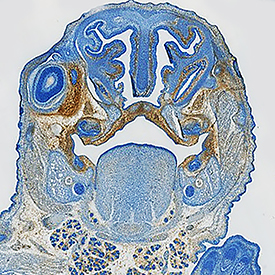Mouse PDGF R beta Biotinylated Antibody Summary
Leu32-Lys530
Accession # P05622
Applications
Please Note: Optimal dilutions should be determined by each laboratory for each application. General Protocols are available in the Technical Information section on our website.
Scientific Data
 View Larger
View Larger
PDGF R beta in Mouse Embryo. PDGF R beta was detected in immersion fixed frozen sections of mouse embryo (13 d.p.c.) using Goat Anti-Mouse PDGF R beta Biotinylated Antigen Affinity-purified Polyclonal Antibody (Catalog # BAF1042) at 15 µg/mL overnight at 4 °C. Tissue was stained using the Anti-Goat HRP-DAB Cell & Tissue Staining Kit (brown; Catalog # CTS008) and counterstained with hematoxylin (blue). Specific staining was localized to developing brain. View our protocol for Chromogenic IHC Staining of Frozen Tissue Sections.
Reconstitution Calculator
Preparation and Storage
- 12 months from date of receipt, -20 to -70 °C as supplied.
- 1 month, 2 to 8 °C under sterile conditions after reconstitution.
- 6 months, -20 to -70 °C under sterile conditions after reconstitution.
Background: PDGF R beta
The platelet-derived growth factor (PDGF) family consists of proteins derived from four genes (PDGF-A, -B, -C, and -D) that form disulfide-linked homodimers (PDGF-AA, -BB, -CC, and -DD) and a heterodimer (PDGF-AB) (1, 2). These proteins regulate diverse cellular functions by binding to and inducing the homo- or hetero‑dimerization of two receptors (PDGF R alpha and R beta ). Whereas alpha / alpha homo-dimerization is induced by PDGF-AA, -BB, -CC, and -AB, alpha / beta hetero‑dimerization is induced by PDGF-AB, -BB, -CC, and -DD, and beta / beta homo-dimerization is induced only by PDGF-BB, and -DD (1‑4). Both PDGF R alpha and R beta are members of the class III subfamily of receptor tyrosine kinases (RTK) that also includes the receptors for M-CSF, SCF and Flt3-ligand. All class III RTKs are characterized by the presence of five immunoglobulin-like domains in their extracellular region and a split kinase domain in their intracellular region. Ligand-induced receptor dimerization results in autophosphorylation in trans resulting in the activation of several intracellular signaling pathways that can lead to cell proliferation, cell survival, cytoskeletal rearrangement, and cell migration. Many cell types, including fibroblasts and smooth muscle cells, express both the alpha and beta receptors. Others have only the alpha receptors (oligodendrocyte progenitor cells, mesothelial cells, liver sinusoidal endothelial cells, astrocytes, platelets and megakaryocytes) or only the beta receptors (myoblasts, capillary endothelial cells, pericytes, T cells, myeloid hematopoietic cells and macrophages). A soluble PDGF R alpha has been detected in normal human plasma and serum as well as in the conditioned medium of the human osteosarcoma cell line MG-63 (5). Both the recombinant mouse and human soluble PDGF R alpha bind PDGF with high affinity and are potent PDGF antagonists.
- Betshotz, C. et al. (2001) BioEssays 23:494.
- Ostman, A. and A.H. Heldin (2001) Advances in Cancer Research 80:1.
- Gilbertson, D. et al. (2001) J. Biol. Chem. 276:27406.
- LaRochells, W.J. et al. (2001) Nature Cell Biol. 3:517.
- Tiesman, J. and C.E. Hart (1993) J. Biol. Chem. 5:9621.
Product Datasheets
Citations for Mouse PDGF R beta Biotinylated Antibody
R&D Systems personnel manually curate a database that contains references using R&D Systems products. The data collected includes not only links to publications in PubMed, but also provides information about sample types, species, and experimental conditions.
6
Citations: Showing 1 - 6
Filter your results:
Filter by:
-
Runx1 and Runx2 inhibit fibrotic conversion of cellular niches for hematopoietic stem cells
Authors: Y Omatsu, S Aiba, T Maeta, K Higaki, K Aoki, H Watanabe, G Kondoh, R Nishimura, S Takeda, UI Chung, T Nagasawa
Nature Communications, 2022-05-12;13(1):2654.
Species: Mouse
Sample Types: Whole Cells
Applications: Flow Cytometry -
MDS cells impair osteolineage differentiation of MSCs via extracellular vesicles to suppress normal hematopoiesis
Authors: Y Hayashi, KC Kawabata, Y Tanaka, Y Uehara, Y Mabuchi, K Murakami, A Nishiyama, S Kiryu, Y Yoshioka, Y Ota, T Sugiyama, K Mikami, M Tamura, T Fukushima, S Asada, R Takeda, Y Kunisaki, T Fukuyama, K Yokoyama, T Uchida, M Hagihara, N Ohno, K Usuki, A Tojo, Y Katayama, S Goyama, F Arai, T Tamura, T Nagasawa, T Ochiya, D Inoue, T Kitamura
Cell Reports, 2022-05-10;39(6):110805.
Species: Mouse
Sample Types: Whole Cells
Applications: Flow Cytometry -
Cell Autonomous and Non-cell Autonomous Regulation of SMC Progenitors in Pulmonary Hypertension
Authors: AQ Sheikh, FZ Saddouk, A Ntokou, R Mazurek, DM Greif
Cell Rep, 2018-04-24;23(4):1152-1165.
Species: Mouse
Sample Types: Whole Tissue
Applications: IHC -
Pericyte ALK5/TIMP3 Axis Contributes to Endothelial Morphogenesis in the Developing Brain
Authors: JM Dave, T Mirabella, SD Weatherbee, DM Greif
Dev. Cell, 2018-02-15;0(0):.
Species: Mouse
Sample Types: Whole Tissue
Applications: IHC-Fr -
Prostacyclin prevents pericyte loss and demyelination induced by lysophosphatidylcholine in the central nervous system.
Authors: Muramatsu R, Kuroda M, Matoba K, Lin H, Takahashi C, Koyama Y, Yamashita T
J Biol Chem, 2015-03-20;290(18):11515-25.
Species: Rat
Sample Types: Whole Cells
Applications: IHC-Fr -
Contribution of neural crest-derived cells in the embryonic and adult thymus.
Authors: Foster K, Sheridan J, Veiga-Fernandes H, Roderick K, Pachnis V, Adams R, Blackburn C, Kioussis D, Coles M
J. Immunol., 2008-03-01;180(5):3183-9.
Species: Mouse
Sample Types: Whole Cells
Applications: Flow Cytometry
FAQs
No product specific FAQs exist for this product, however you may
View all Antibody FAQsReviews for Mouse PDGF R beta Biotinylated Antibody
There are currently no reviews for this product. Be the first to review Mouse PDGF R beta Biotinylated Antibody and earn rewards!
Have you used Mouse PDGF R beta Biotinylated Antibody?
Submit a review and receive an Amazon gift card.
$25/€18/£15/$25CAN/¥75 Yuan/¥2500 Yen for a review with an image
$10/€7/£6/$10 CAD/¥70 Yuan/¥1110 Yen for a review without an image





